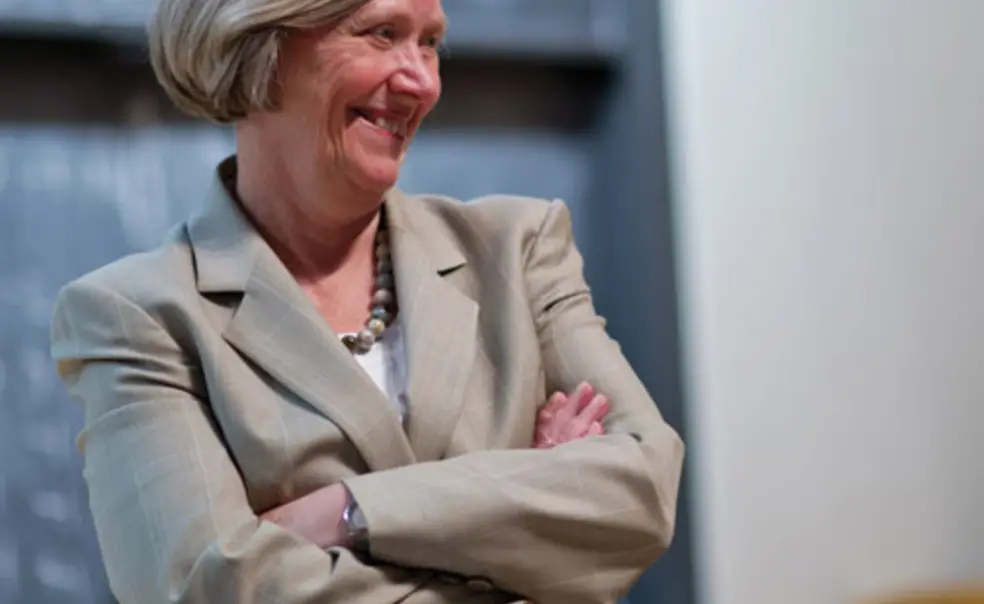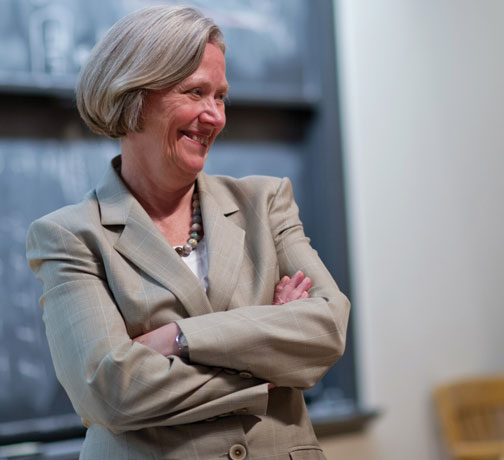Decision to leave helm ‘very easy,’ Tilghman says
President Tilghman understands that a message from “smt@ princeton.edu” can spark action on campus. Like when a student recently went to Tilghman’s office to explain why he wanted to move a chair from one room to another in his dorm — the housing office had objected, but after a few words from the president, the chair was on its way.
“I try not to do that irresponsibly, because I could drive everybody in this university crazy,” Tilghman said with a laugh. “But sometimes our rules and policies can get in the way of common sense. So it’s been a huge pleasure to be able to cut through red tape.”
Last month, Tilghman sent a closely read email of a different kind, announcing to the University community that she plans to step down at the end of the academic year, her 12th in Nassau Hall. Only one trustee, chairwoman Kathryn Hall ’80, had known about the decision before Tilghman told the board Sept. 21, but the timing was not a complete surprise: As early as 2009, she had hinted that she might step down at the conclusion of the Aspire campaign, which raised $1.88 billion, following the example of her predecessor, Harold Shapiro *64.
Tilghman said that after Commencement she took a close look at her future and concluded that completing a new phase in her presidency, following Aspire, would have taken about five years. “That made it very easy, because I don’t think I had another five years in me,” she told PAW, adding that she made her final decision in late summer.
Hall, who will lead the search for the University’s next president, said that Tilghman has been “a truly exceptional president for Princeton, and the board of trustees recognizes and appreciates that.” A 17-member search committee, composed of trustees, faculty, students, and staff, is expected to hold its first meeting in October. (Names of the members were not available for this issue.) Princeton is one of three Ivy universities looking for a new president, along with Dartmouth and Yale.
The first woman to lead Princeton, Tilghman was selected in May 2001 after spending 15 years on the molecular biology faculty. She famously was asked to step down from the presidential search committee so that she could become a candidate for the job.
Her gender was “a major part of the narrative in the beginning,” Tilghman said, but she believes that distinction faded within her first year or two in office. In the decade that followed, she oversaw a wide-ranging agenda at Princeton, including extensive growth in the role of creative and performing arts on campus, multiple major initiatives in the sciences and engineering, an expansion of the undergraduate student body, and the addition of four-year residential colleges. She also guided the University through a period of budget cuts after the endowment lost nearly a quarter of its value in 2008–09.
Tilghman’s signature addition has been the Lewis Center for the Arts, launched in 2006 with the backing of a $101 million gift from Peter B. Lewis ’55. It placed unprecedented emphasis on the creative and performing arts — and later became the focus of a contentious town-gown debate over the configuration of its new home, to be built near McCarter Theatre. According to Professor Paul Muldoon, the Lewis Center’s chairman from 2006 to 2011, Tilghman made the arts a clear priority early in her presidency and “had not only the foresight, but the force” to bring the center to fruition.
The most controversial change under Tilghman may have been the faculty’s adoption of guidelines to curb grade inflation in 2004, a move that has reduced the number of A grades awarded in undergraduate courses. Tilghman said last month that the policy is achieving its goals, but that those goals have been misunderstood.
“I think what got lost in all the drama about the grading policy was that the motivation was fairness to our students — not to disadvantage them, not to punish them, not to grind them down, but for them to be graded consistently and fairly across all the departments,” Tilghman said. “We didn’t do a good job at [communicating] that, and that’s my fault.”
Despite student objections to the grading policy and the recent Greek-affiliation ban for freshmen, English professor Jeff Nunokawa, the master of Rockefeller College since 2007, said he has witnessed a mutual respect between undergraduates and the president. “Even students who disagree with Shirley vehemently would come together around the proposition that she’s someone who listens to what they have to say,” he said.
Throughout her tenure, Tilghman shared the latest campus developments with alumni at regional meetings and in her annual Reunions conversation at Richardson Auditorium. Alumni Association President Henry Von Kohorn ’66 said Tilghman’s strong support for conferences geared to specific alumni groups, such as black and female alums, “helped to create an enduring sense of alumni inclusiveness.”
In her final year in office, Tilghman will meet with alumni across the United States and abroad, visiting South America, China, and the United Kingdom. She plans to spend 2013–14 on sabbatical in London before returning to the faculty the following year.













2 Responses
Martin S. Harris Jr. ’54
10 Years AgoThe Tilghman years
This (usually) Silent Generation alumnus would like to suggest that the Tilghman years (Campus Notebook, Oct. 24) would have been more highly regarded by history if she had devoted some effort to changing Princeton’s relatively new public image as “just another one of those liberal-bias Ivy League academies.” Although admirable advances were made in the hard sciences, the public reputation derives from such decisions as the less-than-halfhearted address of the ROTC question, the ongoing not-obsession-but-remarkable-fixation with all things multi- in race and sex, and the offering of a Princeton pulpit to such as Van Jones, all of which (and more) have served to intensify the gentry-left aura.
“Princeton in the nation’s service” suggests a posture above trendy political correctness and ideology; indeed, the original LaFollette Progressives, of whom President Tilghman would seem to be an intellectual heir, presented themselves as highly skilled technical experts in governance, not advocates for party or ideology. During her 12 years, she could have restored Princeton’s above-the-fray popular image, but made no effort to do so.
Robert Frost would have called it “the road not taken.”
Erika L. Gilson
10 Years AgoThe Tilghman years
Many are the accomplishments during President Tilghman’s tenure. But to me, what made her quite amazing was that, in addition to all her duties, she was there to catch a dance group’s last show on a Sunday afternoon (“They work so hard, they must be supported”); or that she found time to write a long, detailed reference letter for a student in her freshman seminar who was applying to attend a global seminar.